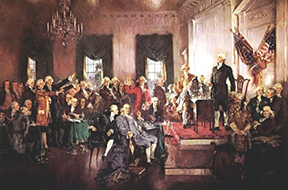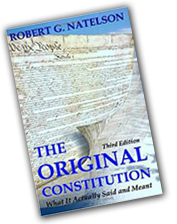 The Constitutional Studies Center combines careful, objective scholarship into the original understanding of the Constitution with advocacy for human freedom under law. It produces books, issue papers, articles, and legal briefs reporting the results of its research. Since 2010, the Center has had enormous influence on constitutional law cases and commentary, but also on policy makers and grass roots activists. For example, the Center’s research findings galvanized the massive and growing “Article V” movement to restore constitutional limits on the federal government.
The Constitutional Studies Center combines careful, objective scholarship into the original understanding of the Constitution with advocacy for human freedom under law. It produces books, issue papers, articles, and legal briefs reporting the results of its research. Since 2010, the Center has had enormous influence on constitutional law cases and commentary, but also on policy makers and grass roots activists. For example, the Center’s research findings galvanized the massive and growing “Article V” movement to restore constitutional limits on the federal government.
Constitutional Studies
- Home
- Constitutional Studies
Latest Posts
Did Judge Silberman ask the Supreme Court to rein in Congress?0
- November 27, 2011
Two notes on the court challenges to Obamacare: First: The Supreme Court has agreed to hear the challenge to the law’s expensive and humiliating Medicaid mandates on the states. The Court did so although no lower court has yet overturned those mandates. This is clearly the correct decision. Those mandates appear to violate even the
READ MOREDr. Krugman’s Rants0
- November 20, 2011
“I think too much realism can actually be a problem.” – Paul Krugman on the PBS Charlie Rose Show, Oct. 12, 2011 ****** Enough is enough. One expects some exaggeration from a political columnist, but one expects at least a minimal level of accuracy if the columnist is a Nobel Laureate—even if he writes for
READ MORECongress, Butt Out! The Constitution Reserves Malpractice Reform for the States0
- November 20, 2011
In their zeal to adopt a federal malpractice reform bill to dictate procedures to state courts, many Republicans in Congress are doing precisely what they rightly accuse Democrats of doing: blithely disregarding the Constitution’s clear limits on federal power. Their proposals, once encapsulated in H.R. 5 and then slipped into the Senate Republican “jobs bill,”
READ MORE
What A Little-Known Colonial Pamphlet Tells Us About the Constitution0
- November 11, 2011
Between 1764 and the Declaration of Independence in 1776 Americans produced a rich series of pamphlets and resolutions listing their grievances against the central government of the British Empire. As I have pointed out before, reading those pamphlets is very helpful in understanding what the Constitution really means. And ignorance of them contributes to common
READ MOREHow Congress Took Control of Indians’ Lives0
- October 28, 2011
Just as Congress has stretched its Interstate Commerce Power into authority over the entire national economy, so it has used the Indian Commerce Clause to justify micro-managing the lives of American Indians and of their tribes. It wasn’t supposed to be that way. The Articles of Confederation gave Congress power over Indian “affairs,” but in
READ MOREYet another “progressive” argument for an unlimited Commerce Power doesn’t add up0
- October 21, 2011
As I’ve pointed out before in this column, there is a sort of cottage industry among “progressive” law professors that involves taking snatches of the Founding-Era record—or imagined snatches—to argue that the current overgrown federal government is really constitutional after all. In past posts, I’ve reported on a misinterpretation of the Necessary and Proper Clause
READ MORE

Get the latest edition of the popular work, The Original Constitution: What It Actually Said and Meant. You can buy it in either hard copy or Kindle form here.
Contact
 Rob Natelson, Senior Fellow, Constitutional Jurisprudence
Rob Natelson, Senior Fellow, Constitutional Jurisprudence
Email: rob.natelson1@gmail.com
Phone: 303-279-6536, ext 114
